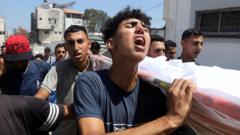A senior Hamas official reports increased mediation efforts for a ceasefire in Gaza, yet talks with Israel are stalled. Recent Israeli airstrikes have resulted in multiple Palestinian casualties and sparked international concern over the humanitarian crisis unfolding in the region.
Ceasefire Negotiations Intensify Amid Ongoing Violence in Gaza

Ceasefire Negotiations Intensify Amid Ongoing Violence in Gaza
Mediators are ramping up efforts to secure a ceasefire and hostage release agreement in Gaza even as violence escalates, resulting in significant casualties.
A senior Hamas official indicated to BBC that mediators are intensifying their efforts to negotiate a ceasefire and a hostage release deal in Gaza, even as talks with Israel have reached an impasse. This development comes amid U.S. President Donald Trump's assertion that "great progress" is being made following a 12-day conflict between Israel and Iran. Trump's envoy Steve Witkoff suggested an agreement between Israel and Hamas could be "very close."
On Wednesday, Israeli airstrikes across Gaza reportedly killed at least 45 Palestinians, many of whom were in search of humanitarian aid, according to the Hamas-run health ministry. Concurrently, the Israeli military reported the death of seven soldiers in a bombing claimed by Hamas.
President Trump mentioned, "I think great progress is being made on Gaza," referencing U.S. air strikes against Iranian targets that he believes have pressured Hamas. However, a senior Hamas official stated that their group has yet to receive a new proposal for a ceasefire.
An Israeli official corroborated the stalling negotiations, emphasizing major unresolved differences between the parties. U.S., Qatari, and Egyptian efforts to broker a deal had previously stalled in May, when Hamas's demands for modifications to a proposed 60-day truce were deemed "totally unacceptable."
Israeli military operations in Gaza, which resumed on March 18, led to the dismantling of a two-month ceasefire. Israel's military strategy aims to force Hamas to release approximately 50 hostages believed to be alive in Gaza. The Israeli government enforced a blockade on humanitarian aid deliveries that was only partially eased after facing international outcry, with dire warnings about widespread starvation among the population.
In its stead, Israel and the U.S. backed the establishment of a new aid distribution system operated by the Gaza Humanitarian Foundation (GHF). This mechanism aims to provide assistance while preventing aid theft by Hamas, a claim that Hamas has publicly rejected. Despite distributing over 44 million meals since May, the GHF has faced backlash from the UN and other humanitarian organizations, who cite concerns over compliance with humanitarian principles.
Recent reports indicate continued fatalities among Palestinians attempting to access aid, further exacerbated by the ongoing conflict. A spokesman for Hamas's Civil Defence agency reported six fatalities from Israeli gunfire near a GHF aid distribution center, among other casualties. Meanwhile, UNICEF expressed concerns about the dire food situation, highlighting the lethal choices being forced on the population due to the crisis.
As casualties mount on both sides, including the deaths of Israeli soldiers in recent fighting, the pressure on Israeli Prime Minister Benjamin Netanyahu to negotiate a ceasefire has intensified. Calls for a halt to hostilities are growing within the Israeli government, particularly following the fatalities of soldiers in southern Gaza.
The conflict, which erupted following a significant Hamas attack on Israel on October 7, continues to take a heavy toll on the already beleaguered civilian population in Gaza, with reports indicating over 56,157 deaths since the onset of hostilities, according to local health officials.























